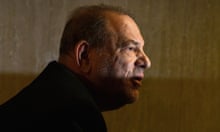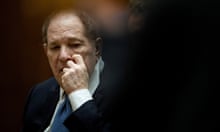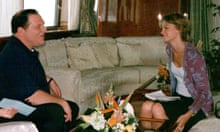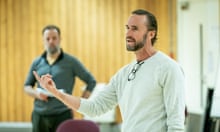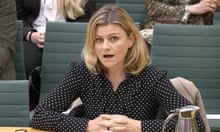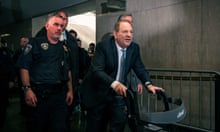In the story behind the story of Harvey Weinstein’s fall from grace, there is a large portion devoted to how the movie producer tried to silence reporting of the allegations against him. For Ronan Farrow, whose investigation for the New Yorker won him a Pulitzer prize in 2018, the effect was paranoia-inducing. He was convinced he was being followed; he thought his phone had been hacked. At one point, he opened a safety deposit box in a vault beneath a branch of Bank of America, and placed in it transcripts of interviews with dozens of sources and a flash drive containing incriminating audio. On top of the pile, he left a note with instructions on whom to contact “should anything happen to me”, and the entreaty: “Please make sure this information is released.”
As it turned out, the surveillance was real, and the threat of legal action constant. The pressure on everyone involved was so intense that, prior to publication of Farrow’s new book, Catch And Kill, he spent so long on the phone with a New Yorker factchecker called Sean, that Sean “got a stress nosebleed”.
We meet in Farrow’s publisher’s office in midtown Manhattan, where the 31-year-old is hastily eating between meetings. When the Weinstein story broke, Farrow was not an anonymous byline; arguably, he was as well known as the producer himself. His parents are Mia Farrow and Woody Allen, and the speculation about their relationship went back decades – as did the controversy around the sexual abuse allegations made by Dylan, Farrow’s older sister, against their father. During the course of the investigation, Weinstein would weaponise all of this to try to unnerve him.
If Farrow was intimidated, it isn’t his style to show it: he is amused, sardonic, diminutive, in a way that invites comparisons to Truman Capote; and, unlike most reporters, highly socially at ease. He is also run ragged. During the Weinstein investigations and others that followed – primarily Farrow’s reporting on Matt Lauer, the former NBC host accused of sexual harassment, about whom the book contains explosive new allegations – Farrow forgot to eat, go out except when following leads, or call his boyfriend in LA. For a while, he says, it was like being, “the homicide beat detective fixated on the one that got away”.
Catch And Kill is a very different book from She Said, the recent account of the Weinstein investigation written by Jodi Kantor and Megan Twohey, the New York Times reporters with whom Farrow shares his Pulitzer prize. She Said is a sober, dispassionate, intensely moving piece of reconstructed reporting, into which the journalists’ home lives do not intrude. Farrow, while as diligent in his reporting, permits himself some licence, the spare voice of his New Yorker articles giving way to something livelier and more personal. The book is darkly funny and poignant, featuring cameos by Jonathan Lovett – his long-suffering partner, and a podcaster and former presidential speechwriter – and Mia Farrow, his mother. If it veers occasionally into Tom Wolfe territory – a literary production too nakedly charmed by itself – it remains a winning account of how it feels to be at the centre of the biggest story in the world. It is also, of course, a breathtakingly dogged piece of reporting, in the face of extraordinary opposition. “The book was an opportunity, yes, to report on brand new leads – there are new revelations there,” Farrow says. “But also to immerse a person in what it’s like to follow the clues.”

Initially, Farrow had more success than Kantor and Twohey at persuading actresses with allegations to go on the record: Mira Sorvino, Asia Argento and Rosanna Arquette all spoke to him about their experiences with Weinstein. One assumes Farrow was assisted in this by his background – he is a brilliant reporter, but he is also a creature of Hollywood and less subject, perhaps, to the natural suspicion that exists between celebrities and hacks – as well as, possibly, by his sexuality.
“I think it was absolutely part of the dynamic,” he says. “Each of us as journalists brings who we are to the table and, in the case of stories about sexual violence, you’re asking people to talk about something that is so invasive and personal, and is about their bodies, and involves recounting in forensic detail these clinical things that are freighted with layers of shame and embarrassment. I think the fact I was not your classic straight guy, coming at it in a way where there was any concern about a leering element, helped in those conversations. I was able to use that to create a space where people felt comfortable.”
Farrow also had a history of reporting on sexual violence. Decades earlier, Dylan Farrow had accused Woody Allen of molesting her when she was seven. An investigation was dropped, but the allegations, which Allen has always denied, lingered. A year before he began investigating Weinstein, Farrow had defended his sister in print and gone on, very vocally, to support her.
His reporting on Weinstein began at NBC, the American TV network. By the time Farrow took the story to the New Yorker, he had a growing witness list, several bombshell interviews, and the smoking gun of a secretly taped conversation acquired by an Italian model called Ambra Battilana Gutierrez; in 2015, Gutierrez had worn a wire for an NYPD investigation into Weinstein and had audio of him harassing her and confessing to groping her. (The Manhattan district attorney had decided not to press charges.)

Farrow believes there are two reasons why NBC first encouraged, and later, he alleges, ordered him to drop the story. (NBC denies this allegation.) The first, he says, was pressure from Weinstein who, through a combination of legal and other threats (to withhold interviews with the stars of his films, for example), manipulated members of upper management, including Farrow’s boss, head of news Noah Oppenheim. Farrow quotes a conversation that he says took place between Andy Lack, the head of the network, and Weinstein, in which the movie producer said that, if he slept with people he shouldn’t have, “it was the 90s, Andy. We all did that.” Lack replied, “Harvey, say no more. We’ll look into it.” (Precisely how Farrow was able to reproduce this conversation remains obscure, though that seems to be a necessary measure undertaken to protect sources, and the book has been fact-checked to New Yorker standards. A note states: “Because this is a story about surveillance, third parties often witnessed or surreptitiously recorded conversations, and I was sometimes able to obtain their testimonials and records.”) There is an unmistakable sense, reading Farrow’s book, of powerful men – and sometimes women – looking out for each other without much need for further incentive.
The second reason NBC cooled on the story, Farrow believes, “is just baseline casual misogyny. And misogyny is a very damning word, but actually it looks quite banal a lot of the time: it’s not believing that it’s an issue that matters. Before the Weinstein story broke, there were people out there in the world who had lived this and seen the machine that shuts these stories down, and understood that it was a big story waiting to happen. But there were a lot of others who, informed by a whole lot of cultural and identity factors, just didn’t care, and didn’t think anyone else would ever care.”
Lack would later put out a memo disparaging Farrow’s reporting about Weinstein, stating that he, “never had a victim or witness willing to be identified”. This was not, Farrow writes, “true of any point in the lifespan of the story at NBC”. He resigned, and published his first piece on Weinstein in the New Yorker on 10 October 2017. Six months later, Weinstein was arrested and released on $1m bail. He is due to stand trial on multiple charges of predatory sexual assault and rape in January.
You don’t, Farrow says, have to believe in vast conspiracy theories to understand why the story got stuck. When writing the book, he says, “I went out of my way to try to convey that the way in which people, and particularly women, with these kinds of claims are silenced doesn’t always look like moustache-twirling villainy.” Instead, he says, “It’s people who think of themselves as being reasonable and compassionate, and very often liberal, acquiescing and becoming examples of moral cowardice – because that’s their cost‑benefit analysis.”
In the early stages of his reporting career, it’s safe to say Ronan Farrow wasn’t taken particularly seriously. He was very blond, very confident, the child of celebrities, who, in spite of a law degree from Yale, a DPhil from Oxford and a period working as a junior official in Hillary Clinton’s state department, still had a whiff of showbiz about him. In June 2016, when he pitched an item to Noah Oppenheim called The Dark Side of Hollywood?, Farrow was in a tricky place: his show Ronan Farrow Daily had been cancelled; he was back to hot-desking at NBC, and woefully behind on a book deadline. On top of that, he was recovering, once again, from intense media interest in his family.

Prior to a cultural shift that would come about in part thanks to Farrow’s reporting, the Woody Allen abuse allegations had divided public opinion. (They resurfaced in 2016, in response to a glowing profile of Allen in the Hollywood Reporter.) A common view was that, while Allen was probably a creep, Mia was completely unglued on this subject after an ugly separation, while Farrow’s support of his sister was overblown. This may well have been the case; Farrow admits that, far from having championed Dylan from the outset, for a long time he had resented her for not letting everyone in the family move on. His public support in 2016 was an effort to make amends.
Dylan is a constant, background presence in Catch And Kill. Farrow calls her for advice on how to talk to a reluctant witness (“Just tell her to hang tough,” she says. “It’s like ripping off a Band-Aid”), and to ask her if he is doing the right thing. Better than anyone, perhaps, he understood how little tolerance people have for allegations of sexual assault; how annoyed and fatigued they get; how hard it is to make these things stick.
“That is exactly the reality,” he says. “Every story I do, there is some effort to suggest that I’m not impartial, and in the Weinstein story, the personal background I had was used against me, time and time again.” The producer wrote to Farrow’s editors telling them he was an unreliable witness, motivated by revenge: Weinstein was Woody Allen’s distributor. “And far from that spurious claim that I had entrenched sympathies because of my sister’s experiences, it was the opposite: I was the guy telling her to shut up.”
You had been a bit of a dick.
“Right. I had been a bit of a dick. I think that’s quite accurate. And I had to go through the journey that I think the culture has gone through, of being dragged to the conclusion that these are serious crimes that are being covered up, and that we need to talk about it more.”
The accusations of partiality were levelled at Farrow in one of many extraordinary legal threats sent by Weinstein to the New Yorker, part of a pattern of intimidation that included putting private detectives on his tail and trying to trap him with false friends and witnesses. (They worked for a private Israeli intelligence outfit called Black Cube; a whistleblower at the company would later leak the contract to Farrow.) A woman called “Diana Filip”, who introduced herself by email as a wealth manager organising a women’s rights conference, turned out to have been hired by Weinstein’s investigators – not only to gather information on Farrow, but to befriend and extract information from Rose McGowan. Farrow discovered that a journalist called Ben Wallace, who had been investigating Weinstein for New York magazine, had been approached by a woman called “Anna”, who claimed to have been assaulted by the producer. She turned out not only to be a private investigator, but the same private investigator who played “Diana Filip”. Meanwhile, two more detectives sat in a car outside Farrow’s apartment.
And the legal threats continued to pour in. Weinstein’s lawyer warned that, while Farrow was “entitled to his private anger… no publisher should allow those personal feelings to create and pursue a baseless and defamatory story from his personal animus”. He went on to suggest that Farrow had been brainwashed into finding Dylan’s claim credible, and to cite, with stunning irrelevance, the fact that Farrow’s uncle had been “sentenced to 10 years in prison for sexually abusing two boys. We have yet to find any evidence that Ronan Farrow has publicly denounced his uncle, and he might have publicly supported him.”

Farrow smiles at the mention of the uncle. “It was almost absurdist to the point of theatre,” he says. “I didn’t know what to make of it. But it was also quite lacerating on a personal level, because you’re working so hard to do a meticulous and fair reporting job, and then suddenly all of these issues that have nothing to do with it – and that are personal and painful – are being thrown at you, like my sister’s assault. It’s a dirty move.”
Further dirty moves followed. Astonishingly, Farrow suggests that at one point Weinstein called Woody Allen for advice, not only on how to stop the story, but on how to handle Farrow. “He wanted to know if Allen would intercede on his behalf. Allen shut down the idea,” Farrow writes. (He is estranged from his father, to whom he refers by his surname.) But at the end of the call, Farrow quotes Allen saying to Weinstein, “Jeez, I’m so sorry. Good luck.”
Most of the threats were theatrical and ludicrous; at one stage, Weinstein said to Farrow, in a line that would have been cut from a script for being too cheesy: “You couldn’t save someone you love, and now you think you can save everyone.” Meanwhile, Weinstein’s connections in New York and Washington DC seemed to leave Farrow no safe port of call. One of Weinstein’s fixers, Jack Palladino, hired to gather potentially harmful information on Farrow, had once worked for the Clintons; Weinstein’s lawyer, David Boies, had deep connections in the liberal media; as did Lisa Bloom, the former champion of women’s rights who represented Weinstein in the early stages of the investigation. (Bloom has since been thoroughly disgraced following publication of a memo in which she shared her strategy for undermining McGowan: “I feel equipped to help you against the Roses of the world, because I have represented so many of them.”) For a while, everywhere Farrow looked, he saw Weinstein.
“You start to realise that if you are wealthy enough and connected enough, you can hire secret agents with false identities, and honeypots to seduce people, and engage in cyberhacking to try to track someone’s location. This is a whole underbelly of what the wealthy and powerful do if they are in a corner,” Farrow says. “And just the gap between the tools available to men like Harvey Weinstein, and those available to any one of the sources in those stories, was incredibly upsetting to witness.”
I tell him I recently noticed a headline in the New York Post referring to Ally Canosa, an event planner and former Weinstein employee who spoke to Farrow, alleging that Weinstein sexually assaulted her multiple times and raped her in a hotel room. “Weinstein accuser sent affectionate emails after alleged sex attack,” ran the headline, followed by a piece effectively trashing Canosa. Is it possible that, even while he is out on bail, Weinstein’s manipulations are ongoing?

“They are without a doubt still ongoing,” Farrow says. “And there are a number of subjects reported on in this book – I’m trying to vague this up, so I’m not talking about anyone [specific] – who are this very week planting pieces of spin about crimes that I report on, to try to get ahead of it in a way that is so demeaning and damaging to the women involved. And the fact that there is still a media infrastructure that supports that is something we should all take a hard look at.”
The book’s big scoop involves Farrow’s former NBC colleague, the TV host Matt Lauer, who was fired from the network in 2017 for “inappropriate sexual behaviour”. At the time, the allegations made against him by a woman at the network were characterised by NBC as an extramarital affair gone awry; neither “criminal” nor “an assault”. According to Farrow, who names the woman as Brooke Nevils, a young production assistant, what allegedly happened meets the definition of rape. In an extraordinary scene towards the end of the book, based on the account Nevils gave Farrow, she goes to Lauer’s hotel room while the pair are reporting on the Sochi Winter Olympics in 2014, and he anally rapes her. “She said that she declined several times, replying, at one point, ‘No, that’s not my thing,’” Farrow writes. “Nevils said that she was still in the midst of telling him she wasn’t interested when he ‘just did it’. Lauer denies that anything non-consensual occurred, then or later, between him and Nevils.
At the heart of this episode is the question of coercion; Nevils, Canosa and most of the women in Farrow’s book are undermined by the men they’re accusing on the basis that they maintained contact after they were allegedly attacked. “It’s this fundamental misapprehension about the nature of sexual violence,” Farrow says, “that it plays out in a context where you would never have any contact again. Very often it plays out because people are vulnerable to those they work with, those in their families, those they can’t avoid seeing again.” Meanwhile, the idea that women who report sexual harassment have something to gain by it – that losing their jobs, reputations and more often than not their self-esteem is just grist for shaking down wealthy men – continues to prosper.

One comes back to the fact that it’s not the crime, it’s the cover-up; that the most shocking aspect of the stories broken by Farrow and his colleagues is not the alleged assaults, but the systems that allow and perpetuate them. Patient zero in both the New York Times and Farrow’s reporting was McGowan, the actor who had for years been making allegations that Weinstein had raped her at the Sundance film festival in 1997. Weinstein’s spin machine went after her hard, briefing against her to journalists, characterising her as “crazy” and an unreliable witness. It worked. I tell Farrow that, more than once while discussing Weinstein in the early stages of the #MeToo movement, I heard myself say, “Rose McGowan sounds pretty nuts,” in an echo of the language once used about Mia Farrow.
“Rose McGowan, as it turns out, is very credible,” Farrow says. “The claims she has made have checked out. She has not made a spurious accusation that I’m aware of. She recounted details that eye witnesses at the time backed up and that documents backed up. Her personality is neither here nor there. To all of these men who were saying, ‘Oh, but she’s too crazy’, I would say we interrogated her claims really, really hard. She’s a great example of that dichotomy – of how sometimes, when people have sustained a lot of emotional damage and behave in a way that reflects that, they open themselves up to that criticism, particularly if they’re women. It becomes a cudgel that’s used to dismiss them.”
It is a depressing landscape that can, at times, seem to offer no break in the flow of new alleged victims. But, says Farrow, “I would not have written this book if I thought it was just a glum and dreary account of how broken our systems are, or how acute the power imbalances.” It’s true that, while the reach of the accused men is terrifying and the scope of the alleged crimes horrific, what one takes away from the story is also the sheer power and solidarity of the women who spoke up. “It is a hopeful story about how whistleblowers at every turn expose the truth.” Film versions will follow – Farrow hasn’t sold his screen rights yet, though Kantor and Twohey’s have gone to Plan B, Brad Pitt’s production company, in conjunction with Annapurna. The threats of legal action will rumble on. In January, Weinstein will plead not guilty in a Manhattan court. And Farrow will continue reporting.

